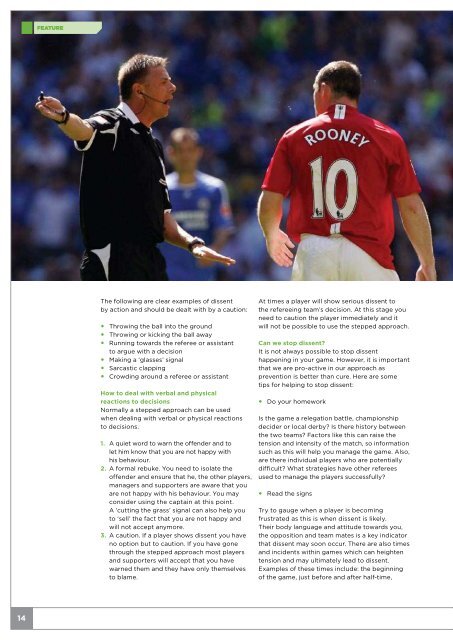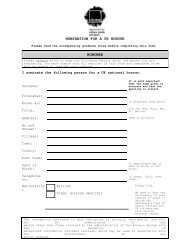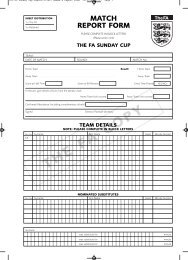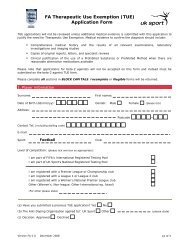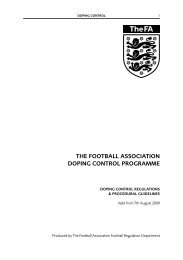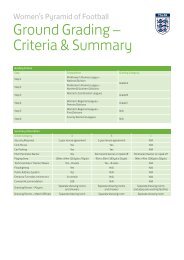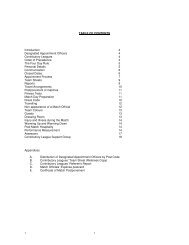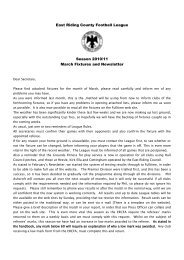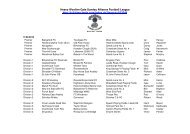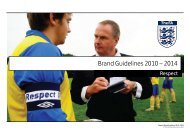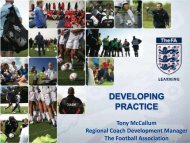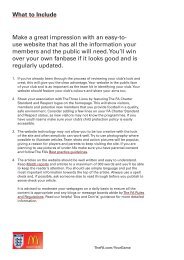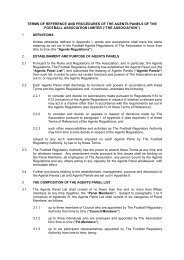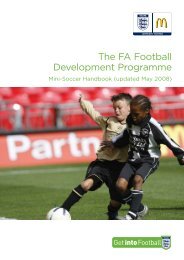RefeReeing offenCeS - The Football Association
RefeReeing offenCeS - The Football Association
RefeReeing offenCeS - The Football Association
You also want an ePaper? Increase the reach of your titles
YUMPU automatically turns print PDFs into web optimized ePapers that Google loves.
FOREWORD<br />
FEATURE<br />
REFEREES<br />
REFEREES<br />
REFEREEING AT THE FA<br />
FITNESS & TRAINING<br />
FEATURE<br />
REFEREEING AT THE FA<br />
THE REFEREES<br />
ASSOCIATION OF ENGLAND<br />
THE REFEREES<br />
ASSOCIATION OF ENGLAND<br />
<strong>The</strong> following are clear examples of dissent<br />
by action and should be dealt with by a caution:<br />
• Throwing the ball into the ground<br />
• Throwing or kicking the ball away<br />
• Running towards the referee or assistant<br />
to argue with a decision<br />
• Making a ‘glasses’ signal<br />
• Sarcastic clapping<br />
• Crowding around a referee or assistant<br />
How to deal with verbal and physical<br />
reactions to decisions<br />
Normally a stepped approach can be used<br />
when dealing with verbal or physical reactions<br />
to decisions.<br />
1. A quiet word to warn the offender and to<br />
let him know that you are not happy with<br />
his behaviour.<br />
2. A formal rebuke. You need to isolate the<br />
offender and ensure that he, the other players,<br />
managers and supporters are aware that you<br />
are not happy with his behaviour. You may<br />
consider using the captain at this point.<br />
A ‘cutting the grass’ signal can also help you<br />
to ‘sell’ the fact that you are not happy and<br />
will not accept anymore.<br />
3. A caution. If a player shows dissent you have<br />
no option but to caution. If you have gone<br />
through the stepped approach most players<br />
and supporters will accept that you have<br />
warned them and they have only themselves<br />
to blame.<br />
At times a player will show serious dissent to<br />
the refereeing team’s decision. At this stage you<br />
need to caution the player immediately and it<br />
will not be possible to use the stepped approach.<br />
Can we stop dissent?<br />
It is not always possible to stop dissent<br />
happening in your game. However, it is important<br />
that we are pro-active in our approach as<br />
prevention is better than cure. Here are some<br />
tips for helping to stop dissent:<br />
• Do your homework<br />
Is the game a relegation battle, championship<br />
decider or local derby? Is there history between<br />
the two teams? Factors like this can raise the<br />
tension and intensity of the match, so information<br />
such as this will help you manage the game. Also,<br />
are there individual players who are potentially<br />
difficult? What strategies have other referees<br />
used to manage the players successfully?<br />
• Read the signs<br />
Try to gauge when a player is becoming<br />
frustrated as this is when dissent is likely.<br />
<strong>The</strong>ir body language and attitude towards you,<br />
the opposition and team mates is a key indicator<br />
that dissent may soon occur. <strong>The</strong>re are also times<br />
and incidents within games which can heighten<br />
tension and may ultimately lead to dissent.<br />
Examples of these times include: the beginning<br />
of the game, just before and after half-time,<br />
when a player has been injured, when there has<br />
been a controversial decision, a last minute goal,<br />
penalty or a red card. <strong>The</strong>se are all potential<br />
flashpoint moments which can cause players<br />
to lose their calm; this can lead to frustration<br />
and ultimately dissent. It is important that you<br />
recognise these moments within games and<br />
then deal with them appropriately. At such times<br />
you may need to ‘raise your profile’. You need<br />
to be alert and react appropriately, using all your<br />
skills to manage the game and avoid dissent.<br />
• Intervene early<br />
As a referee you need to be on the lookout for<br />
players who you feel show dissent. Players who<br />
are making mistakes, being fouled, missing shots,<br />
being criticised by the manager and spectators<br />
are more likely to become frustrated and this<br />
in turn can lead to dissent. In order to prevent<br />
this show some sympathy for the player, try<br />
and ‘work with them’ and get them on your<br />
side. You may wish to use the captain, this is<br />
something that many referees have done for a<br />
long time but is now more actively encouraged<br />
and appreciated due to the Respect programme.<br />
If a player will not listen to you maybe the<br />
captain or a key player can calm the player down?<br />
• Manage players and the game<br />
Use your skills and management techniques<br />
in order to manage the game and players.<br />
Recognise that some players will respond well<br />
to a joke to diffuse the tension whereas others<br />
will need you to take more formal action earlier<br />
in the game.<br />
• Quality and accuracy of decision-making<br />
<strong>The</strong> best way to minimise dissent is to get<br />
decisions, especially critical decisions, right.<br />
Your key refereeing skills of positioning,<br />
signals and reading the game will help you<br />
make correct decisions and ‘sell’ your decisions<br />
confidently which will reduce the amount<br />
of dissent you experience.<br />
Conclusion<br />
Be pro-active in your approach to dissent.<br />
Don’t take dissent personally and do not allow<br />
the players to undermine your confidence in your<br />
decision-making. Develop your overall refereeing<br />
skills and your ability to deal with dissent and<br />
you will become a better official and enjoy the<br />
game more. You have a responsibility to the<br />
game, yourself and your colleagues to deal with<br />
dissent. Doing nothing is simply not an option.<br />
A player who is guilty of dissent<br />
by protesting (verbally or<br />
non-verbally) against a referee’s<br />
decision must be cautioned<br />
14 REFEreeing VOLUME 09 15


